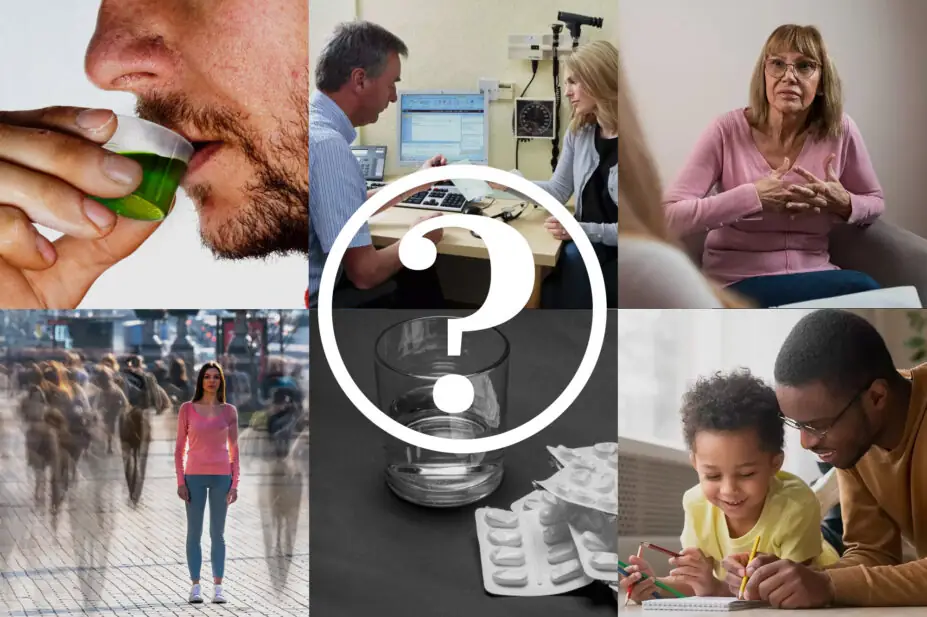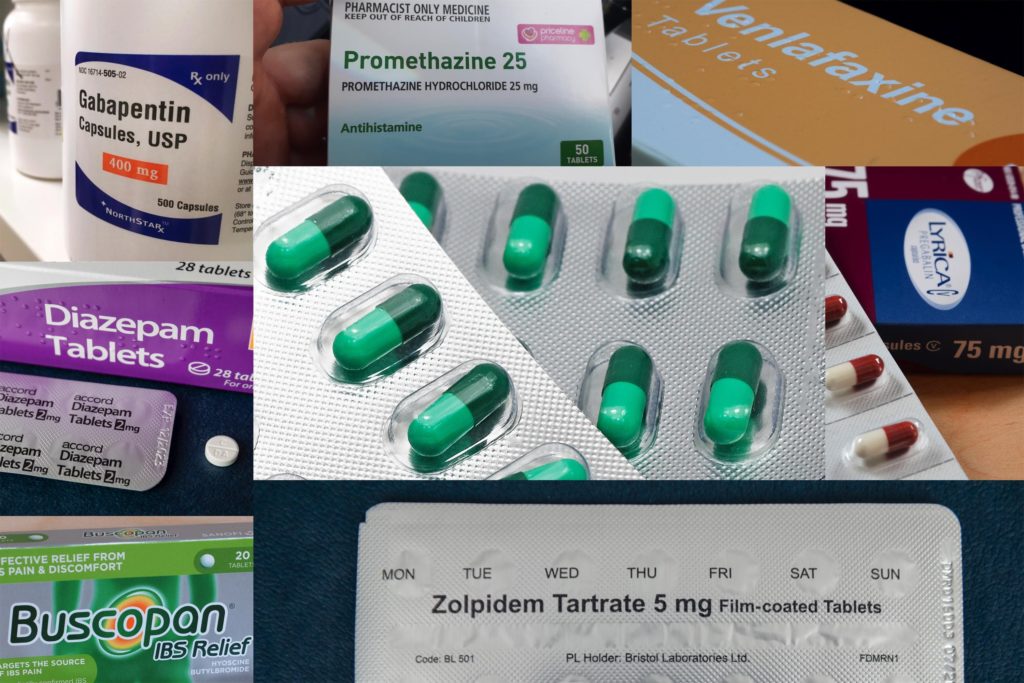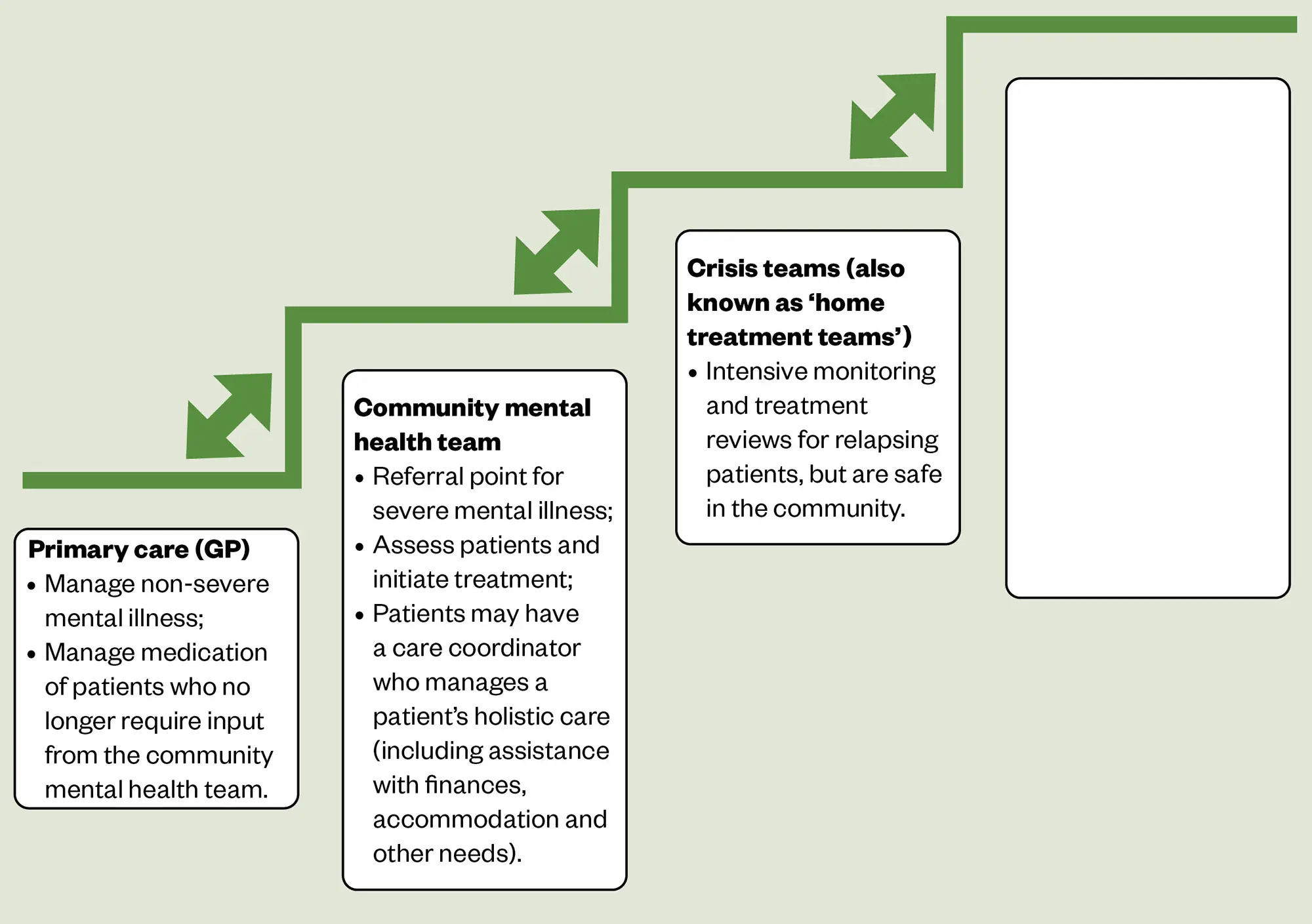
Medicines are a primary treatment tool for many mental health conditions. For pharmacists to use their expert skills to help patients with mental health challenges, it is vital that they have a good understanding of those conditions.
Work your way through the quiz by expanding the questions in the boxes below. Each question includes a link to a relevant PJ article providing more information on the topic. When you have answered all the questions, select ‘Finish quiz’ at the bottom of the page to check your score.
For practice-based questions that could be influenced by various factors, please select the response that you judge to be the single best answer.
Switching antidepressants

SATURN STILLS/SCIENCE PHOTO LIBRARY
In the right circumstances, changing to a different antidepressant can improve the chances of successfully treating depression, but judgement is required when considering if a switch is appropriate. Expand question 1 to test your knowledge.
Quiz Summary
0 of 15 Questions completed
Questions:
Information
You have already completed the quiz before. Hence you can not start it again.
Quiz is loading...
You must sign in or sign up to start the quiz.
You must first complete the following:
Results
Results
0 of 15 Questions answered correctly
Your time:
Time has elapsed
You have reached 0 of 0 point(s), (0)
Earned Point(s): 0 of 0, (0)
0 Essay(s) Pending (Possible Point(s): 0)
Categories
- Not categorized 0%
- 1
- 2
- 3
- 4
- 5
- 6
- 7
- 8
- 9
- 10
- 11
- 12
- 13
- 14
- 15
- Current
- Review
- Answered
- Correct
- Incorrect
- Question 1 of 15
1. Question
What percentage of patients fail to show a response to their antidepressant medication despite adequate dose and duration of treatment?
CorrectIncorrect - Question 2 of 15
2. Question
Older people with depression may present with physical symptoms or declining cognitive function, rather than low mood. Is this true or false?
CorrectIncorrect - Question 3 of 15
3. Question
Which of the following mental health conditions are NOT more common in children and young people with type 1 diabetes mellitus than children without? Select all that apply.
CorrectIncorrect - Question 4 of 15
4. Question
What medicine is most commonly seen in overdose cases in UK hospital emergency departments?
CorrectIncorrect - Question 5 of 15
5. Question
Sort these risk factors for suicide into the correct categories.
Sort elements
- Male
- Severe financial difficulties
- Chronic pain
- Access to means
- Demographic factor
- Social factor
- Health factor
- Other risk factor
CorrectIncorrect - Question 6 of 15
6. Question
Fill in the blank.
Options: increase, decrease, stay the same
If a patient with an opioid addiction does not take their medication-assisted treatment (e.g. methadone, buprenorphine) on schedule, their tolerance to the drug is likely to .
CorrectIncorrect - Question 7 of 15
7. Question
Which of the following groups have NOT been found to be at a higher risk of misusing medications than the general population?
CorrectIncorrect - Question 8 of 15
8. Question
It is thought that attention-deficit hyperactivity disorder is most underdiagnosed in which group?
CorrectIncorrect - Question 9 of 15
9. Question
Recommended on a case-by-case basis, which TWO of the following medicines have shown some benefit for repetitive behaviours in people with autism?
CorrectIncorrect - Question 10 of 15
10. Question
Look at the figure above, which shows the organisational structure of UK mental health services. What is the final stage in escalation of care intensity?
CorrectIncorrect - Question 11 of 15
11. Question
The SCOFF test is a screening tool used to identify eating disorders. Drag and drop the questions on the right so that they correspond with the correct letter in the SCOFF acronym.
Sort elements
- So you make yourself sick because you feel uncomfortably full?
- Do you worry you have lost control over how much you eat?
- Have you recently lost more than one stone in a three-month period?
- Do you believe yourself to be fat when others say you are too thin?
- Would you say food dominates your life?
- S
- C
- O
- F
- F
CorrectIncorrect - Question 12 of 15
12. Question
Melatonin is a hormone produced by the body after dark that tells the body it is approaching the time for sleep. The amount of this hormone that the body produces differs with age. What age group produces the most amount of melatonin naturally?
CorrectIncorrect - Question 13 of 15
13. Question
Pharmacogenetic testing has the potential to identify whether patients will respond well or poorly to a drug. The CYP2D6 isoenzyme is involved in the metabolism of 40% of antipsychotics. People carry variations of the CYP isoenzyme that will affect this metabolism; if a patient is a poor or intermediate metaboliser, they would:
CorrectIncorrect - Question 14 of 15
14. Question
People of ethnic minority backgrounds are more likely to be involuntarily detained under the Mental Health Act 1983.
CorrectIncorrect - Question 15 of 15
15. Question
Which TWO of the following types of anxiety are the most common?
CorrectIncorrect
This question is from ‘Switching antidepressants: advice and practicalities’. Please refer to the original article if you would like to learn more.
Older women’s mental health

Shutterstock.com
Later life (age 50 years and over) can be a period of transition and adjustment to loss for many women, which can impact a person’s wellbeing and mental health. Expand question 2 to test your knowledge.
Quiz Summary
0 of 15 Questions completed
Questions:
Information
You have already completed the quiz before. Hence you can not start it again.
Quiz is loading...
You must sign in or sign up to start the quiz.
You must first complete the following:
Results
Results
0 of 15 Questions answered correctly
Your time:
Time has elapsed
You have reached 0 of 0 point(s), (0)
Earned Point(s): 0 of 0, (0)
0 Essay(s) Pending (Possible Point(s): 0)
Categories
- Not categorized 0%
- 1
- 2
- 3
- 4
- 5
- 6
- 7
- 8
- 9
- 10
- 11
- 12
- 13
- 14
- 15
- Current
- Review
- Answered
- Correct
- Incorrect
- Question 1 of 15
1. Question
What percentage of patients fail to show a response to their antidepressant medication despite adequate dose and duration of treatment?
CorrectIncorrect - Question 2 of 15
2. Question
Older people with depression may present with physical symptoms or declining cognitive function, rather than low mood. Is this true or false?
CorrectIncorrect - Question 3 of 15
3. Question
Which of the following mental health conditions are NOT more common in children and young people with type 1 diabetes mellitus than children without? Select all that apply.
CorrectIncorrect - Question 4 of 15
4. Question
What medicine is most commonly seen in overdose cases in UK hospital emergency departments?
CorrectIncorrect - Question 5 of 15
5. Question
Sort these risk factors for suicide into the correct categories.
Sort elements
- Male
- Severe financial difficulties
- Chronic pain
- Access to means
- Demographic factor
- Social factor
- Health factor
- Other risk factor
CorrectIncorrect - Question 6 of 15
6. Question
Fill in the blank.
Options: increase, decrease, stay the same
If a patient with an opioid addiction does not take their medication-assisted treatment (e.g. methadone, buprenorphine) on schedule, their tolerance to the drug is likely to .
CorrectIncorrect - Question 7 of 15
7. Question
Which of the following groups have NOT been found to be at a higher risk of misusing medications than the general population?
CorrectIncorrect - Question 8 of 15
8. Question
It is thought that attention-deficit hyperactivity disorder is most underdiagnosed in which group?
CorrectIncorrect - Question 9 of 15
9. Question
Recommended on a case-by-case basis, which TWO of the following medicines have shown some benefit for repetitive behaviours in people with autism?
CorrectIncorrect - Question 10 of 15
10. Question
Look at the figure above, which shows the organisational structure of UK mental health services. What is the final stage in escalation of care intensity?
CorrectIncorrect - Question 11 of 15
11. Question
The SCOFF test is a screening tool used to identify eating disorders. Drag and drop the questions on the right so that they correspond with the correct letter in the SCOFF acronym.
Sort elements
- So you make yourself sick because you feel uncomfortably full?
- Do you worry you have lost control over how much you eat?
- Have you recently lost more than one stone in a three-month period?
- Do you believe yourself to be fat when others say you are too thin?
- Would you say food dominates your life?
- S
- C
- O
- F
- F
CorrectIncorrect - Question 12 of 15
12. Question
Melatonin is a hormone produced by the body after dark that tells the body it is approaching the time for sleep. The amount of this hormone that the body produces differs with age. What age group produces the most amount of melatonin naturally?
CorrectIncorrect - Question 13 of 15
13. Question
Pharmacogenetic testing has the potential to identify whether patients will respond well or poorly to a drug. The CYP2D6 isoenzyme is involved in the metabolism of 40% of antipsychotics. People carry variations of the CYP isoenzyme that will affect this metabolism; if a patient is a poor or intermediate metaboliser, they would:
CorrectIncorrect - Question 14 of 15
14. Question
People of ethnic minority backgrounds are more likely to be involuntarily detained under the Mental Health Act 1983.
CorrectIncorrect - Question 15 of 15
15. Question
Which TWO of the following types of anxiety are the most common?
CorrectIncorrect
This question is from ‘Mental health considerations in older women’. Please refer to the original article if you would like to learn more.
Impact of physical conditions on mental health

Shutterstock.com
Living with type 1 diabetes mellitus poses a unique set of challenges for children and young people, as well as their families, which can have an impact on emotional wellbeing. Expand question 3 to test your knowledge.
Quiz Summary
0 of 15 Questions completed
Questions:
Information
You have already completed the quiz before. Hence you can not start it again.
Quiz is loading...
You must sign in or sign up to start the quiz.
You must first complete the following:
Results
Results
0 of 15 Questions answered correctly
Your time:
Time has elapsed
You have reached 0 of 0 point(s), (0)
Earned Point(s): 0 of 0, (0)
0 Essay(s) Pending (Possible Point(s): 0)
Categories
- Not categorized 0%
- 1
- 2
- 3
- 4
- 5
- 6
- 7
- 8
- 9
- 10
- 11
- 12
- 13
- 14
- 15
- Current
- Review
- Answered
- Correct
- Incorrect
- Question 1 of 15
1. Question
What percentage of patients fail to show a response to their antidepressant medication despite adequate dose and duration of treatment?
CorrectIncorrect - Question 2 of 15
2. Question
Older people with depression may present with physical symptoms or declining cognitive function, rather than low mood. Is this true or false?
CorrectIncorrect - Question 3 of 15
3. Question
Which of the following mental health conditions are NOT more common in children and young people with type 1 diabetes mellitus than children without? Select all that apply.
CorrectIncorrect - Question 4 of 15
4. Question
What medicine is most commonly seen in overdose cases in UK hospital emergency departments?
CorrectIncorrect - Question 5 of 15
5. Question
Sort these risk factors for suicide into the correct categories.
Sort elements
- Male
- Severe financial difficulties
- Chronic pain
- Access to means
- Demographic factor
- Social factor
- Health factor
- Other risk factor
CorrectIncorrect - Question 6 of 15
6. Question
Fill in the blank.
Options: increase, decrease, stay the same
If a patient with an opioid addiction does not take their medication-assisted treatment (e.g. methadone, buprenorphine) on schedule, their tolerance to the drug is likely to .
CorrectIncorrect - Question 7 of 15
7. Question
Which of the following groups have NOT been found to be at a higher risk of misusing medications than the general population?
CorrectIncorrect - Question 8 of 15
8. Question
It is thought that attention-deficit hyperactivity disorder is most underdiagnosed in which group?
CorrectIncorrect - Question 9 of 15
9. Question
Recommended on a case-by-case basis, which TWO of the following medicines have shown some benefit for repetitive behaviours in people with autism?
CorrectIncorrect - Question 10 of 15
10. Question
Look at the figure above, which shows the organisational structure of UK mental health services. What is the final stage in escalation of care intensity?
CorrectIncorrect - Question 11 of 15
11. Question
The SCOFF test is a screening tool used to identify eating disorders. Drag and drop the questions on the right so that they correspond with the correct letter in the SCOFF acronym.
Sort elements
- So you make yourself sick because you feel uncomfortably full?
- Do you worry you have lost control over how much you eat?
- Have you recently lost more than one stone in a three-month period?
- Do you believe yourself to be fat when others say you are too thin?
- Would you say food dominates your life?
- S
- C
- O
- F
- F
CorrectIncorrect - Question 12 of 15
12. Question
Melatonin is a hormone produced by the body after dark that tells the body it is approaching the time for sleep. The amount of this hormone that the body produces differs with age. What age group produces the most amount of melatonin naturally?
CorrectIncorrect - Question 13 of 15
13. Question
Pharmacogenetic testing has the potential to identify whether patients will respond well or poorly to a drug. The CYP2D6 isoenzyme is involved in the metabolism of 40% of antipsychotics. People carry variations of the CYP isoenzyme that will affect this metabolism; if a patient is a poor or intermediate metaboliser, they would:
CorrectIncorrect - Question 14 of 15
14. Question
People of ethnic minority backgrounds are more likely to be involuntarily detained under the Mental Health Act 1983.
CorrectIncorrect - Question 15 of 15
15. Question
Which TWO of the following types of anxiety are the most common?
CorrectIncorrect
This question is from ‘Emotional wellbeing in children and young people with diabetes’. Please refer to the original article if you would like to learn more.
Poisonings

Shutterstock.com
Patients experiencing mental health conditions are one of the groups that may present to emergency departments acutely for poisoning and overdose. Expand question 4 to test your knowledge.
Quiz Summary
0 of 15 Questions completed
Questions:
Information
You have already completed the quiz before. Hence you can not start it again.
Quiz is loading...
You must sign in or sign up to start the quiz.
You must first complete the following:
Results
Results
0 of 15 Questions answered correctly
Your time:
Time has elapsed
You have reached 0 of 0 point(s), (0)
Earned Point(s): 0 of 0, (0)
0 Essay(s) Pending (Possible Point(s): 0)
Categories
- Not categorized 0%
- 1
- 2
- 3
- 4
- 5
- 6
- 7
- 8
- 9
- 10
- 11
- 12
- 13
- 14
- 15
- Current
- Review
- Answered
- Correct
- Incorrect
- Question 1 of 15
1. Question
What percentage of patients fail to show a response to their antidepressant medication despite adequate dose and duration of treatment?
CorrectIncorrect - Question 2 of 15
2. Question
Older people with depression may present with physical symptoms or declining cognitive function, rather than low mood. Is this true or false?
CorrectIncorrect - Question 3 of 15
3. Question
Which of the following mental health conditions are NOT more common in children and young people with type 1 diabetes mellitus than children without? Select all that apply.
CorrectIncorrect - Question 4 of 15
4. Question
What medicine is most commonly seen in overdose cases in UK hospital emergency departments?
CorrectIncorrect - Question 5 of 15
5. Question
Sort these risk factors for suicide into the correct categories.
Sort elements
- Male
- Severe financial difficulties
- Chronic pain
- Access to means
- Demographic factor
- Social factor
- Health factor
- Other risk factor
CorrectIncorrect - Question 6 of 15
6. Question
Fill in the blank.
Options: increase, decrease, stay the same
If a patient with an opioid addiction does not take their medication-assisted treatment (e.g. methadone, buprenorphine) on schedule, their tolerance to the drug is likely to .
CorrectIncorrect - Question 7 of 15
7. Question
Which of the following groups have NOT been found to be at a higher risk of misusing medications than the general population?
CorrectIncorrect - Question 8 of 15
8. Question
It is thought that attention-deficit hyperactivity disorder is most underdiagnosed in which group?
CorrectIncorrect - Question 9 of 15
9. Question
Recommended on a case-by-case basis, which TWO of the following medicines have shown some benefit for repetitive behaviours in people with autism?
CorrectIncorrect - Question 10 of 15
10. Question
Look at the figure above, which shows the organisational structure of UK mental health services. What is the final stage in escalation of care intensity?
CorrectIncorrect - Question 11 of 15
11. Question
The SCOFF test is a screening tool used to identify eating disorders. Drag and drop the questions on the right so that they correspond with the correct letter in the SCOFF acronym.
Sort elements
- So you make yourself sick because you feel uncomfortably full?
- Do you worry you have lost control over how much you eat?
- Have you recently lost more than one stone in a three-month period?
- Do you believe yourself to be fat when others say you are too thin?
- Would you say food dominates your life?
- S
- C
- O
- F
- F
CorrectIncorrect - Question 12 of 15
12. Question
Melatonin is a hormone produced by the body after dark that tells the body it is approaching the time for sleep. The amount of this hormone that the body produces differs with age. What age group produces the most amount of melatonin naturally?
CorrectIncorrect - Question 13 of 15
13. Question
Pharmacogenetic testing has the potential to identify whether patients will respond well or poorly to a drug. The CYP2D6 isoenzyme is involved in the metabolism of 40% of antipsychotics. People carry variations of the CYP isoenzyme that will affect this metabolism; if a patient is a poor or intermediate metaboliser, they would:
CorrectIncorrect - Question 14 of 15
14. Question
People of ethnic minority backgrounds are more likely to be involuntarily detained under the Mental Health Act 1983.
CorrectIncorrect - Question 15 of 15
15. Question
Which TWO of the following types of anxiety are the most common?
CorrectIncorrect
This question is from ‘Management of poisonings: the pharmacists role’. Please refer to the original article if you would like to learn more.
Suicide

Shutterstock.com
It is important that pharmacists are aware of the risk factors for suicide, as well as the psychological frameworks and practical tools that can be used when dealing with disclosure of suicidal ideation. Expand question 5 to test your knowledge.
Quiz Summary
0 of 15 Questions completed
Questions:
Information
You have already completed the quiz before. Hence you can not start it again.
Quiz is loading...
You must sign in or sign up to start the quiz.
You must first complete the following:
Results
Results
0 of 15 Questions answered correctly
Your time:
Time has elapsed
You have reached 0 of 0 point(s), (0)
Earned Point(s): 0 of 0, (0)
0 Essay(s) Pending (Possible Point(s): 0)
Categories
- Not categorized 0%
- 1
- 2
- 3
- 4
- 5
- 6
- 7
- 8
- 9
- 10
- 11
- 12
- 13
- 14
- 15
- Current
- Review
- Answered
- Correct
- Incorrect
- Question 1 of 15
1. Question
What percentage of patients fail to show a response to their antidepressant medication despite adequate dose and duration of treatment?
CorrectIncorrect - Question 2 of 15
2. Question
Older people with depression may present with physical symptoms or declining cognitive function, rather than low mood. Is this true or false?
CorrectIncorrect - Question 3 of 15
3. Question
Which of the following mental health conditions are NOT more common in children and young people with type 1 diabetes mellitus than children without? Select all that apply.
CorrectIncorrect - Question 4 of 15
4. Question
What medicine is most commonly seen in overdose cases in UK hospital emergency departments?
CorrectIncorrect - Question 5 of 15
5. Question
Sort these risk factors for suicide into the correct categories.
Sort elements
- Male
- Severe financial difficulties
- Chronic pain
- Access to means
- Demographic factor
- Social factor
- Health factor
- Other risk factor
CorrectIncorrect - Question 6 of 15
6. Question
Fill in the blank.
Options: increase, decrease, stay the same
If a patient with an opioid addiction does not take their medication-assisted treatment (e.g. methadone, buprenorphine) on schedule, their tolerance to the drug is likely to .
CorrectIncorrect - Question 7 of 15
7. Question
Which of the following groups have NOT been found to be at a higher risk of misusing medications than the general population?
CorrectIncorrect - Question 8 of 15
8. Question
It is thought that attention-deficit hyperactivity disorder is most underdiagnosed in which group?
CorrectIncorrect - Question 9 of 15
9. Question
Recommended on a case-by-case basis, which TWO of the following medicines have shown some benefit for repetitive behaviours in people with autism?
CorrectIncorrect - Question 10 of 15
10. Question
Look at the figure above, which shows the organisational structure of UK mental health services. What is the final stage in escalation of care intensity?
CorrectIncorrect - Question 11 of 15
11. Question
The SCOFF test is a screening tool used to identify eating disorders. Drag and drop the questions on the right so that they correspond with the correct letter in the SCOFF acronym.
Sort elements
- So you make yourself sick because you feel uncomfortably full?
- Do you worry you have lost control over how much you eat?
- Have you recently lost more than one stone in a three-month period?
- Do you believe yourself to be fat when others say you are too thin?
- Would you say food dominates your life?
- S
- C
- O
- F
- F
CorrectIncorrect - Question 12 of 15
12. Question
Melatonin is a hormone produced by the body after dark that tells the body it is approaching the time for sleep. The amount of this hormone that the body produces differs with age. What age group produces the most amount of melatonin naturally?
CorrectIncorrect - Question 13 of 15
13. Question
Pharmacogenetic testing has the potential to identify whether patients will respond well or poorly to a drug. The CYP2D6 isoenzyme is involved in the metabolism of 40% of antipsychotics. People carry variations of the CYP isoenzyme that will affect this metabolism; if a patient is a poor or intermediate metaboliser, they would:
CorrectIncorrect - Question 14 of 15
14. Question
People of ethnic minority backgrounds are more likely to be involuntarily detained under the Mental Health Act 1983.
CorrectIncorrect - Question 15 of 15
15. Question
Which TWO of the following types of anxiety are the most common?
CorrectIncorrect
This question is from ‘Suicide: how to recognise the warning signs and deal with disclosure’. Please refer to the original article if you would like to learn more.
Addiction and drug misuse

CORDELIA MOLLOY/SCIENCE PHOTO LIBRARY
Medicines adherence is vital to both successful treatment outcomes and the prevention of overdose in treated opiate users. Expand question 6 to test your knowledge.
Quiz Summary
0 of 15 Questions completed
Questions:
Information
You have already completed the quiz before. Hence you can not start it again.
Quiz is loading...
You must sign in or sign up to start the quiz.
You must first complete the following:
Results
Results
0 of 15 Questions answered correctly
Your time:
Time has elapsed
You have reached 0 of 0 point(s), (0)
Earned Point(s): 0 of 0, (0)
0 Essay(s) Pending (Possible Point(s): 0)
Categories
- Not categorized 0%
- 1
- 2
- 3
- 4
- 5
- 6
- 7
- 8
- 9
- 10
- 11
- 12
- 13
- 14
- 15
- Current
- Review
- Answered
- Correct
- Incorrect
- Question 1 of 15
1. Question
What percentage of patients fail to show a response to their antidepressant medication despite adequate dose and duration of treatment?
CorrectIncorrect - Question 2 of 15
2. Question
Older people with depression may present with physical symptoms or declining cognitive function, rather than low mood. Is this true or false?
CorrectIncorrect - Question 3 of 15
3. Question
Which of the following mental health conditions are NOT more common in children and young people with type 1 diabetes mellitus than children without? Select all that apply.
CorrectIncorrect - Question 4 of 15
4. Question
What medicine is most commonly seen in overdose cases in UK hospital emergency departments?
CorrectIncorrect - Question 5 of 15
5. Question
Sort these risk factors for suicide into the correct categories.
Sort elements
- Male
- Severe financial difficulties
- Chronic pain
- Access to means
- Demographic factor
- Social factor
- Health factor
- Other risk factor
CorrectIncorrect - Question 6 of 15
6. Question
Fill in the blank.
Options: increase, decrease, stay the same
If a patient with an opioid addiction does not take their medication-assisted treatment (e.g. methadone, buprenorphine) on schedule, their tolerance to the drug is likely to .
CorrectIncorrect - Question 7 of 15
7. Question
Which of the following groups have NOT been found to be at a higher risk of misusing medications than the general population?
CorrectIncorrect - Question 8 of 15
8. Question
It is thought that attention-deficit hyperactivity disorder is most underdiagnosed in which group?
CorrectIncorrect - Question 9 of 15
9. Question
Recommended on a case-by-case basis, which TWO of the following medicines have shown some benefit for repetitive behaviours in people with autism?
CorrectIncorrect - Question 10 of 15
10. Question
Look at the figure above, which shows the organisational structure of UK mental health services. What is the final stage in escalation of care intensity?
CorrectIncorrect - Question 11 of 15
11. Question
The SCOFF test is a screening tool used to identify eating disorders. Drag and drop the questions on the right so that they correspond with the correct letter in the SCOFF acronym.
Sort elements
- So you make yourself sick because you feel uncomfortably full?
- Do you worry you have lost control over how much you eat?
- Have you recently lost more than one stone in a three-month period?
- Do you believe yourself to be fat when others say you are too thin?
- Would you say food dominates your life?
- S
- C
- O
- F
- F
CorrectIncorrect - Question 12 of 15
12. Question
Melatonin is a hormone produced by the body after dark that tells the body it is approaching the time for sleep. The amount of this hormone that the body produces differs with age. What age group produces the most amount of melatonin naturally?
CorrectIncorrect - Question 13 of 15
13. Question
Pharmacogenetic testing has the potential to identify whether patients will respond well or poorly to a drug. The CYP2D6 isoenzyme is involved in the metabolism of 40% of antipsychotics. People carry variations of the CYP isoenzyme that will affect this metabolism; if a patient is a poor or intermediate metaboliser, they would:
CorrectIncorrect - Question 14 of 15
14. Question
People of ethnic minority backgrounds are more likely to be involuntarily detained under the Mental Health Act 1983.
CorrectIncorrect - Question 15 of 15
15. Question
Which TWO of the following types of anxiety are the most common?
CorrectIncorrect
This question is from ‘Opioid use disorder: adherence to prescribed medicines in community pharmacy’. Please refer to the original article if you would like to learn more.
Misuse of prescription and over-the-counter drugs

Shutterstock.com
A range of prescription and over-the-counter drugs have the potential to be misused for recreational purposes. Expand question 7 to test your knowledge.
Quiz Summary
0 of 15 Questions completed
Questions:
Information
You have already completed the quiz before. Hence you can not start it again.
Quiz is loading...
You must sign in or sign up to start the quiz.
You must first complete the following:
Results
Results
0 of 15 Questions answered correctly
Your time:
Time has elapsed
You have reached 0 of 0 point(s), (0)
Earned Point(s): 0 of 0, (0)
0 Essay(s) Pending (Possible Point(s): 0)
Categories
- Not categorized 0%
- 1
- 2
- 3
- 4
- 5
- 6
- 7
- 8
- 9
- 10
- 11
- 12
- 13
- 14
- 15
- Current
- Review
- Answered
- Correct
- Incorrect
- Question 1 of 15
1. Question
What percentage of patients fail to show a response to their antidepressant medication despite adequate dose and duration of treatment?
CorrectIncorrect - Question 2 of 15
2. Question
Older people with depression may present with physical symptoms or declining cognitive function, rather than low mood. Is this true or false?
CorrectIncorrect - Question 3 of 15
3. Question
Which of the following mental health conditions are NOT more common in children and young people with type 1 diabetes mellitus than children without? Select all that apply.
CorrectIncorrect - Question 4 of 15
4. Question
What medicine is most commonly seen in overdose cases in UK hospital emergency departments?
CorrectIncorrect - Question 5 of 15
5. Question
Sort these risk factors for suicide into the correct categories.
Sort elements
- Male
- Severe financial difficulties
- Chronic pain
- Access to means
- Demographic factor
- Social factor
- Health factor
- Other risk factor
CorrectIncorrect - Question 6 of 15
6. Question
Fill in the blank.
Options: increase, decrease, stay the same
If a patient with an opioid addiction does not take their medication-assisted treatment (e.g. methadone, buprenorphine) on schedule, their tolerance to the drug is likely to .
CorrectIncorrect - Question 7 of 15
7. Question
Which of the following groups have NOT been found to be at a higher risk of misusing medications than the general population?
CorrectIncorrect - Question 8 of 15
8. Question
It is thought that attention-deficit hyperactivity disorder is most underdiagnosed in which group?
CorrectIncorrect - Question 9 of 15
9. Question
Recommended on a case-by-case basis, which TWO of the following medicines have shown some benefit for repetitive behaviours in people with autism?
CorrectIncorrect - Question 10 of 15
10. Question
Look at the figure above, which shows the organisational structure of UK mental health services. What is the final stage in escalation of care intensity?
CorrectIncorrect - Question 11 of 15
11. Question
The SCOFF test is a screening tool used to identify eating disorders. Drag and drop the questions on the right so that they correspond with the correct letter in the SCOFF acronym.
Sort elements
- So you make yourself sick because you feel uncomfortably full?
- Do you worry you have lost control over how much you eat?
- Have you recently lost more than one stone in a three-month period?
- Do you believe yourself to be fat when others say you are too thin?
- Would you say food dominates your life?
- S
- C
- O
- F
- F
CorrectIncorrect - Question 12 of 15
12. Question
Melatonin is a hormone produced by the body after dark that tells the body it is approaching the time for sleep. The amount of this hormone that the body produces differs with age. What age group produces the most amount of melatonin naturally?
CorrectIncorrect - Question 13 of 15
13. Question
Pharmacogenetic testing has the potential to identify whether patients will respond well or poorly to a drug. The CYP2D6 isoenzyme is involved in the metabolism of 40% of antipsychotics. People carry variations of the CYP isoenzyme that will affect this metabolism; if a patient is a poor or intermediate metaboliser, they would:
CorrectIncorrect - Question 14 of 15
14. Question
People of ethnic minority backgrounds are more likely to be involuntarily detained under the Mental Health Act 1983.
CorrectIncorrect - Question 15 of 15
15. Question
Which TWO of the following types of anxiety are the most common?
CorrectIncorrect
This question is from ‘Misuse of prescription and over-the-counter drugs to obtain illicit highs: how pharmacists can prevent abuse’. Please refer to the original article if you would like to learn more.
Neurodevelopmental disorders

Shutterstock.com
Attention deficit hyperactivity disorder (ADHD) is a common neurodevelopmental disorder characterised by age-inappropriate levels of inattention, hyperactivity and impulsivity. Expand question 8 to test your knowledge.
Quiz Summary
0 of 15 Questions completed
Questions:
Information
You have already completed the quiz before. Hence you can not start it again.
Quiz is loading...
You must sign in or sign up to start the quiz.
You must first complete the following:
Results
Results
0 of 15 Questions answered correctly
Your time:
Time has elapsed
You have reached 0 of 0 point(s), (0)
Earned Point(s): 0 of 0, (0)
0 Essay(s) Pending (Possible Point(s): 0)
Categories
- Not categorized 0%
- 1
- 2
- 3
- 4
- 5
- 6
- 7
- 8
- 9
- 10
- 11
- 12
- 13
- 14
- 15
- Current
- Review
- Answered
- Correct
- Incorrect
- Question 1 of 15
1. Question
What percentage of patients fail to show a response to their antidepressant medication despite adequate dose and duration of treatment?
CorrectIncorrect - Question 2 of 15
2. Question
Older people with depression may present with physical symptoms or declining cognitive function, rather than low mood. Is this true or false?
CorrectIncorrect - Question 3 of 15
3. Question
Which of the following mental health conditions are NOT more common in children and young people with type 1 diabetes mellitus than children without? Select all that apply.
CorrectIncorrect - Question 4 of 15
4. Question
What medicine is most commonly seen in overdose cases in UK hospital emergency departments?
CorrectIncorrect - Question 5 of 15
5. Question
Sort these risk factors for suicide into the correct categories.
Sort elements
- Male
- Severe financial difficulties
- Chronic pain
- Access to means
- Demographic factor
- Social factor
- Health factor
- Other risk factor
CorrectIncorrect - Question 6 of 15
6. Question
Fill in the blank.
Options: increase, decrease, stay the same
If a patient with an opioid addiction does not take their medication-assisted treatment (e.g. methadone, buprenorphine) on schedule, their tolerance to the drug is likely to .
CorrectIncorrect - Question 7 of 15
7. Question
Which of the following groups have NOT been found to be at a higher risk of misusing medications than the general population?
CorrectIncorrect - Question 8 of 15
8. Question
It is thought that attention-deficit hyperactivity disorder is most underdiagnosed in which group?
CorrectIncorrect - Question 9 of 15
9. Question
Recommended on a case-by-case basis, which TWO of the following medicines have shown some benefit for repetitive behaviours in people with autism?
CorrectIncorrect - Question 10 of 15
10. Question
Look at the figure above, which shows the organisational structure of UK mental health services. What is the final stage in escalation of care intensity?
CorrectIncorrect - Question 11 of 15
11. Question
The SCOFF test is a screening tool used to identify eating disorders. Drag and drop the questions on the right so that they correspond with the correct letter in the SCOFF acronym.
Sort elements
- So you make yourself sick because you feel uncomfortably full?
- Do you worry you have lost control over how much you eat?
- Have you recently lost more than one stone in a three-month period?
- Do you believe yourself to be fat when others say you are too thin?
- Would you say food dominates your life?
- S
- C
- O
- F
- F
CorrectIncorrect - Question 12 of 15
12. Question
Melatonin is a hormone produced by the body after dark that tells the body it is approaching the time for sleep. The amount of this hormone that the body produces differs with age. What age group produces the most amount of melatonin naturally?
CorrectIncorrect - Question 13 of 15
13. Question
Pharmacogenetic testing has the potential to identify whether patients will respond well or poorly to a drug. The CYP2D6 isoenzyme is involved in the metabolism of 40% of antipsychotics. People carry variations of the CYP isoenzyme that will affect this metabolism; if a patient is a poor or intermediate metaboliser, they would:
CorrectIncorrect - Question 14 of 15
14. Question
People of ethnic minority backgrounds are more likely to be involuntarily detained under the Mental Health Act 1983.
CorrectIncorrect - Question 15 of 15
15. Question
Which TWO of the following types of anxiety are the most common?
CorrectIncorrect
This question is from ‘Attention deficit hyperactivity disorder: characteristics and diagnosis’. Please refer to the original article if you would like to learn more.
Supporting people with autism

Shutterstock.com
Pharmacists need a robust knowledge of autism, and the challenges faced by autistic individuals and their carers, and should be able to identify potential overprescribing of antipsychotic medications. Expand question 9 to test your knowledge.
Quiz Summary
0 of 15 Questions completed
Questions:
Information
You have already completed the quiz before. Hence you can not start it again.
Quiz is loading...
You must sign in or sign up to start the quiz.
You must first complete the following:
Results
Results
0 of 15 Questions answered correctly
Your time:
Time has elapsed
You have reached 0 of 0 point(s), (0)
Earned Point(s): 0 of 0, (0)
0 Essay(s) Pending (Possible Point(s): 0)
Categories
- Not categorized 0%
- 1
- 2
- 3
- 4
- 5
- 6
- 7
- 8
- 9
- 10
- 11
- 12
- 13
- 14
- 15
- Current
- Review
- Answered
- Correct
- Incorrect
- Question 1 of 15
1. Question
What percentage of patients fail to show a response to their antidepressant medication despite adequate dose and duration of treatment?
CorrectIncorrect - Question 2 of 15
2. Question
Older people with depression may present with physical symptoms or declining cognitive function, rather than low mood. Is this true or false?
CorrectIncorrect - Question 3 of 15
3. Question
Which of the following mental health conditions are NOT more common in children and young people with type 1 diabetes mellitus than children without? Select all that apply.
CorrectIncorrect - Question 4 of 15
4. Question
What medicine is most commonly seen in overdose cases in UK hospital emergency departments?
CorrectIncorrect - Question 5 of 15
5. Question
Sort these risk factors for suicide into the correct categories.
Sort elements
- Male
- Severe financial difficulties
- Chronic pain
- Access to means
- Demographic factor
- Social factor
- Health factor
- Other risk factor
CorrectIncorrect - Question 6 of 15
6. Question
Fill in the blank.
Options: increase, decrease, stay the same
If a patient with an opioid addiction does not take their medication-assisted treatment (e.g. methadone, buprenorphine) on schedule, their tolerance to the drug is likely to .
CorrectIncorrect - Question 7 of 15
7. Question
Which of the following groups have NOT been found to be at a higher risk of misusing medications than the general population?
CorrectIncorrect - Question 8 of 15
8. Question
It is thought that attention-deficit hyperactivity disorder is most underdiagnosed in which group?
CorrectIncorrect - Question 9 of 15
9. Question
Recommended on a case-by-case basis, which TWO of the following medicines have shown some benefit for repetitive behaviours in people with autism?
CorrectIncorrect - Question 10 of 15
10. Question
Look at the figure above, which shows the organisational structure of UK mental health services. What is the final stage in escalation of care intensity?
CorrectIncorrect - Question 11 of 15
11. Question
The SCOFF test is a screening tool used to identify eating disorders. Drag and drop the questions on the right so that they correspond with the correct letter in the SCOFF acronym.
Sort elements
- So you make yourself sick because you feel uncomfortably full?
- Do you worry you have lost control over how much you eat?
- Have you recently lost more than one stone in a three-month period?
- Do you believe yourself to be fat when others say you are too thin?
- Would you say food dominates your life?
- S
- C
- O
- F
- F
CorrectIncorrect - Question 12 of 15
12. Question
Melatonin is a hormone produced by the body after dark that tells the body it is approaching the time for sleep. The amount of this hormone that the body produces differs with age. What age group produces the most amount of melatonin naturally?
CorrectIncorrect - Question 13 of 15
13. Question
Pharmacogenetic testing has the potential to identify whether patients will respond well or poorly to a drug. The CYP2D6 isoenzyme is involved in the metabolism of 40% of antipsychotics. People carry variations of the CYP isoenzyme that will affect this metabolism; if a patient is a poor or intermediate metaboliser, they would:
CorrectIncorrect - Question 14 of 15
14. Question
People of ethnic minority backgrounds are more likely to be involuntarily detained under the Mental Health Act 1983.
CorrectIncorrect - Question 15 of 15
15. Question
Which TWO of the following types of anxiety are the most common?
CorrectIncorrect
This question is from ‘Autism: identification, management and support’ . Please refer to the original article if you would like to learn more.
Psychosis

The Pharmaceutical Journal
It is important to adopt a multidisciplinary and patient-centred approach when managing psychosis and take measures to optimise treatment with antipsychotics. Expand question 10 to test your knowledge.
Quiz Summary
0 of 15 Questions completed
Questions:
Information
You have already completed the quiz before. Hence you can not start it again.
Quiz is loading...
You must sign in or sign up to start the quiz.
You must first complete the following:
Results
Results
0 of 15 Questions answered correctly
Your time:
Time has elapsed
You have reached 0 of 0 point(s), (0)
Earned Point(s): 0 of 0, (0)
0 Essay(s) Pending (Possible Point(s): 0)
Categories
- Not categorized 0%
- 1
- 2
- 3
- 4
- 5
- 6
- 7
- 8
- 9
- 10
- 11
- 12
- 13
- 14
- 15
- Current
- Review
- Answered
- Correct
- Incorrect
- Question 1 of 15
1. Question
What percentage of patients fail to show a response to their antidepressant medication despite adequate dose and duration of treatment?
CorrectIncorrect - Question 2 of 15
2. Question
Older people with depression may present with physical symptoms or declining cognitive function, rather than low mood. Is this true or false?
CorrectIncorrect - Question 3 of 15
3. Question
Which of the following mental health conditions are NOT more common in children and young people with type 1 diabetes mellitus than children without? Select all that apply.
CorrectIncorrect - Question 4 of 15
4. Question
What medicine is most commonly seen in overdose cases in UK hospital emergency departments?
CorrectIncorrect - Question 5 of 15
5. Question
Sort these risk factors for suicide into the correct categories.
Sort elements
- Male
- Severe financial difficulties
- Chronic pain
- Access to means
- Demographic factor
- Social factor
- Health factor
- Other risk factor
CorrectIncorrect - Question 6 of 15
6. Question
Fill in the blank.
Options: increase, decrease, stay the same
If a patient with an opioid addiction does not take their medication-assisted treatment (e.g. methadone, buprenorphine) on schedule, their tolerance to the drug is likely to .
CorrectIncorrect - Question 7 of 15
7. Question
Which of the following groups have NOT been found to be at a higher risk of misusing medications than the general population?
CorrectIncorrect - Question 8 of 15
8. Question
It is thought that attention-deficit hyperactivity disorder is most underdiagnosed in which group?
CorrectIncorrect - Question 9 of 15
9. Question
Recommended on a case-by-case basis, which TWO of the following medicines have shown some benefit for repetitive behaviours in people with autism?
CorrectIncorrect - Question 10 of 15
10. Question
Look at the figure above, which shows the organisational structure of UK mental health services. What is the final stage in escalation of care intensity?
CorrectIncorrect - Question 11 of 15
11. Question
The SCOFF test is a screening tool used to identify eating disorders. Drag and drop the questions on the right so that they correspond with the correct letter in the SCOFF acronym.
Sort elements
- So you make yourself sick because you feel uncomfortably full?
- Do you worry you have lost control over how much you eat?
- Have you recently lost more than one stone in a three-month period?
- Do you believe yourself to be fat when others say you are too thin?
- Would you say food dominates your life?
- S
- C
- O
- F
- F
CorrectIncorrect - Question 12 of 15
12. Question
Melatonin is a hormone produced by the body after dark that tells the body it is approaching the time for sleep. The amount of this hormone that the body produces differs with age. What age group produces the most amount of melatonin naturally?
CorrectIncorrect - Question 13 of 15
13. Question
Pharmacogenetic testing has the potential to identify whether patients will respond well or poorly to a drug. The CYP2D6 isoenzyme is involved in the metabolism of 40% of antipsychotics. People carry variations of the CYP isoenzyme that will affect this metabolism; if a patient is a poor or intermediate metaboliser, they would:
CorrectIncorrect - Question 14 of 15
14. Question
People of ethnic minority backgrounds are more likely to be involuntarily detained under the Mental Health Act 1983.
CorrectIncorrect - Question 15 of 15
15. Question
Which TWO of the following types of anxiety are the most common?
CorrectIncorrect
This question is from ‘Case study: treatment-resistant schizophrenia’. Please refer to the original article if you would like to learn more.
Eating disorders

Toa Heftiba (Unsplash)
Pharmacists are well positioned to identify the signs and symptoms of an eating disorder and can provide access to sources of help and support. Expand question 11 to test your knowledge.
Quiz Summary
0 of 15 Questions completed
Questions:
Information
You have already completed the quiz before. Hence you can not start it again.
Quiz is loading...
You must sign in or sign up to start the quiz.
You must first complete the following:
Results
Results
0 of 15 Questions answered correctly
Your time:
Time has elapsed
You have reached 0 of 0 point(s), (0)
Earned Point(s): 0 of 0, (0)
0 Essay(s) Pending (Possible Point(s): 0)
Categories
- Not categorized 0%
- 1
- 2
- 3
- 4
- 5
- 6
- 7
- 8
- 9
- 10
- 11
- 12
- 13
- 14
- 15
- Current
- Review
- Answered
- Correct
- Incorrect
- Question 1 of 15
1. Question
What percentage of patients fail to show a response to their antidepressant medication despite adequate dose and duration of treatment?
CorrectIncorrect - Question 2 of 15
2. Question
Older people with depression may present with physical symptoms or declining cognitive function, rather than low mood. Is this true or false?
CorrectIncorrect - Question 3 of 15
3. Question
Which of the following mental health conditions are NOT more common in children and young people with type 1 diabetes mellitus than children without? Select all that apply.
CorrectIncorrect - Question 4 of 15
4. Question
What medicine is most commonly seen in overdose cases in UK hospital emergency departments?
CorrectIncorrect - Question 5 of 15
5. Question
Sort these risk factors for suicide into the correct categories.
Sort elements
- Male
- Severe financial difficulties
- Chronic pain
- Access to means
- Demographic factor
- Social factor
- Health factor
- Other risk factor
CorrectIncorrect - Question 6 of 15
6. Question
Fill in the blank.
Options: increase, decrease, stay the same
If a patient with an opioid addiction does not take their medication-assisted treatment (e.g. methadone, buprenorphine) on schedule, their tolerance to the drug is likely to .
CorrectIncorrect - Question 7 of 15
7. Question
Which of the following groups have NOT been found to be at a higher risk of misusing medications than the general population?
CorrectIncorrect - Question 8 of 15
8. Question
It is thought that attention-deficit hyperactivity disorder is most underdiagnosed in which group?
CorrectIncorrect - Question 9 of 15
9. Question
Recommended on a case-by-case basis, which TWO of the following medicines have shown some benefit for repetitive behaviours in people with autism?
CorrectIncorrect - Question 10 of 15
10. Question
Look at the figure above, which shows the organisational structure of UK mental health services. What is the final stage in escalation of care intensity?
CorrectIncorrect - Question 11 of 15
11. Question
The SCOFF test is a screening tool used to identify eating disorders. Drag and drop the questions on the right so that they correspond with the correct letter in the SCOFF acronym.
Sort elements
- So you make yourself sick because you feel uncomfortably full?
- Do you worry you have lost control over how much you eat?
- Have you recently lost more than one stone in a three-month period?
- Do you believe yourself to be fat when others say you are too thin?
- Would you say food dominates your life?
- S
- C
- O
- F
- F
CorrectIncorrect - Question 12 of 15
12. Question
Melatonin is a hormone produced by the body after dark that tells the body it is approaching the time for sleep. The amount of this hormone that the body produces differs with age. What age group produces the most amount of melatonin naturally?
CorrectIncorrect - Question 13 of 15
13. Question
Pharmacogenetic testing has the potential to identify whether patients will respond well or poorly to a drug. The CYP2D6 isoenzyme is involved in the metabolism of 40% of antipsychotics. People carry variations of the CYP isoenzyme that will affect this metabolism; if a patient is a poor or intermediate metaboliser, they would:
CorrectIncorrect - Question 14 of 15
14. Question
People of ethnic minority backgrounds are more likely to be involuntarily detained under the Mental Health Act 1983.
CorrectIncorrect - Question 15 of 15
15. Question
Which TWO of the following types of anxiety are the most common?
CorrectIncorrect
This question is from ‘Eating disorders: identification, treatment and support’. Please refer to the original article if you would like to learn more.
Sleep disorders

Shutterstock.com
Over the years, many different pharmacological treatments have been used to address sleep problems; however, as more is understood about how they work, it is important to consider their safety profile. Expand question 12 to test your knowledge.
Quiz Summary
0 of 15 Questions completed
Questions:
Information
You have already completed the quiz before. Hence you can not start it again.
Quiz is loading...
You must sign in or sign up to start the quiz.
You must first complete the following:
Results
Results
0 of 15 Questions answered correctly
Your time:
Time has elapsed
You have reached 0 of 0 point(s), (0)
Earned Point(s): 0 of 0, (0)
0 Essay(s) Pending (Possible Point(s): 0)
Categories
- Not categorized 0%
- 1
- 2
- 3
- 4
- 5
- 6
- 7
- 8
- 9
- 10
- 11
- 12
- 13
- 14
- 15
- Current
- Review
- Answered
- Correct
- Incorrect
- Question 1 of 15
1. Question
What percentage of patients fail to show a response to their antidepressant medication despite adequate dose and duration of treatment?
CorrectIncorrect - Question 2 of 15
2. Question
Older people with depression may present with physical symptoms or declining cognitive function, rather than low mood. Is this true or false?
CorrectIncorrect - Question 3 of 15
3. Question
Which of the following mental health conditions are NOT more common in children and young people with type 1 diabetes mellitus than children without? Select all that apply.
CorrectIncorrect - Question 4 of 15
4. Question
What medicine is most commonly seen in overdose cases in UK hospital emergency departments?
CorrectIncorrect - Question 5 of 15
5. Question
Sort these risk factors for suicide into the correct categories.
Sort elements
- Male
- Severe financial difficulties
- Chronic pain
- Access to means
- Demographic factor
- Social factor
- Health factor
- Other risk factor
CorrectIncorrect - Question 6 of 15
6. Question
Fill in the blank.
Options: increase, decrease, stay the same
If a patient with an opioid addiction does not take their medication-assisted treatment (e.g. methadone, buprenorphine) on schedule, their tolerance to the drug is likely to .
CorrectIncorrect - Question 7 of 15
7. Question
Which of the following groups have NOT been found to be at a higher risk of misusing medications than the general population?
CorrectIncorrect - Question 8 of 15
8. Question
It is thought that attention-deficit hyperactivity disorder is most underdiagnosed in which group?
CorrectIncorrect - Question 9 of 15
9. Question
Recommended on a case-by-case basis, which TWO of the following medicines have shown some benefit for repetitive behaviours in people with autism?
CorrectIncorrect - Question 10 of 15
10. Question
Look at the figure above, which shows the organisational structure of UK mental health services. What is the final stage in escalation of care intensity?
CorrectIncorrect - Question 11 of 15
11. Question
The SCOFF test is a screening tool used to identify eating disorders. Drag and drop the questions on the right so that they correspond with the correct letter in the SCOFF acronym.
Sort elements
- So you make yourself sick because you feel uncomfortably full?
- Do you worry you have lost control over how much you eat?
- Have you recently lost more than one stone in a three-month period?
- Do you believe yourself to be fat when others say you are too thin?
- Would you say food dominates your life?
- S
- C
- O
- F
- F
CorrectIncorrect - Question 12 of 15
12. Question
Melatonin is a hormone produced by the body after dark that tells the body it is approaching the time for sleep. The amount of this hormone that the body produces differs with age. What age group produces the most amount of melatonin naturally?
CorrectIncorrect - Question 13 of 15
13. Question
Pharmacogenetic testing has the potential to identify whether patients will respond well or poorly to a drug. The CYP2D6 isoenzyme is involved in the metabolism of 40% of antipsychotics. People carry variations of the CYP isoenzyme that will affect this metabolism; if a patient is a poor or intermediate metaboliser, they would:
CorrectIncorrect - Question 14 of 15
14. Question
People of ethnic minority backgrounds are more likely to be involuntarily detained under the Mental Health Act 1983.
CorrectIncorrect - Question 15 of 15
15. Question
Which TWO of the following types of anxiety are the most common?
CorrectIncorrect
This question is from ‘Insomnia: the great melatonin delusion’. Please refer to the original article if you would like to learn more.
Pharmacogenomics in mental health

Sergey Drozd / Alamy Stock Photo
There is much to be gained from improving our understanding of the role of genetics in drug response, and pharmacogenomic testing could help in the treatment of mental health conditions. Expand question 13 to test your knowledge.
Quiz Summary
0 of 15 Questions completed
Questions:
Information
You have already completed the quiz before. Hence you can not start it again.
Quiz is loading...
You must sign in or sign up to start the quiz.
You must first complete the following:
Results
Results
0 of 15 Questions answered correctly
Your time:
Time has elapsed
You have reached 0 of 0 point(s), (0)
Earned Point(s): 0 of 0, (0)
0 Essay(s) Pending (Possible Point(s): 0)
Categories
- Not categorized 0%
- 1
- 2
- 3
- 4
- 5
- 6
- 7
- 8
- 9
- 10
- 11
- 12
- 13
- 14
- 15
- Current
- Review
- Answered
- Correct
- Incorrect
- Question 1 of 15
1. Question
What percentage of patients fail to show a response to their antidepressant medication despite adequate dose and duration of treatment?
CorrectIncorrect - Question 2 of 15
2. Question
Older people with depression may present with physical symptoms or declining cognitive function, rather than low mood. Is this true or false?
CorrectIncorrect - Question 3 of 15
3. Question
Which of the following mental health conditions are NOT more common in children and young people with type 1 diabetes mellitus than children without? Select all that apply.
CorrectIncorrect - Question 4 of 15
4. Question
What medicine is most commonly seen in overdose cases in UK hospital emergency departments?
CorrectIncorrect - Question 5 of 15
5. Question
Sort these risk factors for suicide into the correct categories.
Sort elements
- Male
- Severe financial difficulties
- Chronic pain
- Access to means
- Demographic factor
- Social factor
- Health factor
- Other risk factor
CorrectIncorrect - Question 6 of 15
6. Question
Fill in the blank.
Options: increase, decrease, stay the same
If a patient with an opioid addiction does not take their medication-assisted treatment (e.g. methadone, buprenorphine) on schedule, their tolerance to the drug is likely to .
CorrectIncorrect - Question 7 of 15
7. Question
Which of the following groups have NOT been found to be at a higher risk of misusing medications than the general population?
CorrectIncorrect - Question 8 of 15
8. Question
It is thought that attention-deficit hyperactivity disorder is most underdiagnosed in which group?
CorrectIncorrect - Question 9 of 15
9. Question
Recommended on a case-by-case basis, which TWO of the following medicines have shown some benefit for repetitive behaviours in people with autism?
CorrectIncorrect - Question 10 of 15
10. Question
Look at the figure above, which shows the organisational structure of UK mental health services. What is the final stage in escalation of care intensity?
CorrectIncorrect - Question 11 of 15
11. Question
The SCOFF test is a screening tool used to identify eating disorders. Drag and drop the questions on the right so that they correspond with the correct letter in the SCOFF acronym.
Sort elements
- So you make yourself sick because you feel uncomfortably full?
- Do you worry you have lost control over how much you eat?
- Have you recently lost more than one stone in a three-month period?
- Do you believe yourself to be fat when others say you are too thin?
- Would you say food dominates your life?
- S
- C
- O
- F
- F
CorrectIncorrect - Question 12 of 15
12. Question
Melatonin is a hormone produced by the body after dark that tells the body it is approaching the time for sleep. The amount of this hormone that the body produces differs with age. What age group produces the most amount of melatonin naturally?
CorrectIncorrect - Question 13 of 15
13. Question
Pharmacogenetic testing has the potential to identify whether patients will respond well or poorly to a drug. The CYP2D6 isoenzyme is involved in the metabolism of 40% of antipsychotics. People carry variations of the CYP isoenzyme that will affect this metabolism; if a patient is a poor or intermediate metaboliser, they would:
CorrectIncorrect - Question 14 of 15
14. Question
People of ethnic minority backgrounds are more likely to be involuntarily detained under the Mental Health Act 1983.
CorrectIncorrect - Question 15 of 15
15. Question
Which TWO of the following types of anxiety are the most common?
CorrectIncorrect
This question is from ‘Making the case for pharmacogenomics in the management of mental health conditions’. Please refer to the original answer if you would like to learn more.
Healthcare inequalities

Mclean/Shutterstock.com
Inequalities exist across many areas of healthcare but are particularly evident in mental health settings, where healthcare professionals can restrict choices, hospital stays and treatments. Expand question 14 to test your knowledge.
Quiz Summary
0 of 15 Questions completed
Questions:
Information
You have already completed the quiz before. Hence you can not start it again.
Quiz is loading...
You must sign in or sign up to start the quiz.
You must first complete the following:
Results
Results
0 of 15 Questions answered correctly
Your time:
Time has elapsed
You have reached 0 of 0 point(s), (0)
Earned Point(s): 0 of 0, (0)
0 Essay(s) Pending (Possible Point(s): 0)
Categories
- Not categorized 0%
- 1
- 2
- 3
- 4
- 5
- 6
- 7
- 8
- 9
- 10
- 11
- 12
- 13
- 14
- 15
- Current
- Review
- Answered
- Correct
- Incorrect
- Question 1 of 15
1. Question
What percentage of patients fail to show a response to their antidepressant medication despite adequate dose and duration of treatment?
CorrectIncorrect - Question 2 of 15
2. Question
Older people with depression may present with physical symptoms or declining cognitive function, rather than low mood. Is this true or false?
CorrectIncorrect - Question 3 of 15
3. Question
Which of the following mental health conditions are NOT more common in children and young people with type 1 diabetes mellitus than children without? Select all that apply.
CorrectIncorrect - Question 4 of 15
4. Question
What medicine is most commonly seen in overdose cases in UK hospital emergency departments?
CorrectIncorrect - Question 5 of 15
5. Question
Sort these risk factors for suicide into the correct categories.
Sort elements
- Male
- Severe financial difficulties
- Chronic pain
- Access to means
- Demographic factor
- Social factor
- Health factor
- Other risk factor
CorrectIncorrect - Question 6 of 15
6. Question
Fill in the blank.
Options: increase, decrease, stay the same
If a patient with an opioid addiction does not take their medication-assisted treatment (e.g. methadone, buprenorphine) on schedule, their tolerance to the drug is likely to .
CorrectIncorrect - Question 7 of 15
7. Question
Which of the following groups have NOT been found to be at a higher risk of misusing medications than the general population?
CorrectIncorrect - Question 8 of 15
8. Question
It is thought that attention-deficit hyperactivity disorder is most underdiagnosed in which group?
CorrectIncorrect - Question 9 of 15
9. Question
Recommended on a case-by-case basis, which TWO of the following medicines have shown some benefit for repetitive behaviours in people with autism?
CorrectIncorrect - Question 10 of 15
10. Question
Look at the figure above, which shows the organisational structure of UK mental health services. What is the final stage in escalation of care intensity?
CorrectIncorrect - Question 11 of 15
11. Question
The SCOFF test is a screening tool used to identify eating disorders. Drag and drop the questions on the right so that they correspond with the correct letter in the SCOFF acronym.
Sort elements
- So you make yourself sick because you feel uncomfortably full?
- Do you worry you have lost control over how much you eat?
- Have you recently lost more than one stone in a three-month period?
- Do you believe yourself to be fat when others say you are too thin?
- Would you say food dominates your life?
- S
- C
- O
- F
- F
CorrectIncorrect - Question 12 of 15
12. Question
Melatonin is a hormone produced by the body after dark that tells the body it is approaching the time for sleep. The amount of this hormone that the body produces differs with age. What age group produces the most amount of melatonin naturally?
CorrectIncorrect - Question 13 of 15
13. Question
Pharmacogenetic testing has the potential to identify whether patients will respond well or poorly to a drug. The CYP2D6 isoenzyme is involved in the metabolism of 40% of antipsychotics. People carry variations of the CYP isoenzyme that will affect this metabolism; if a patient is a poor or intermediate metaboliser, they would:
CorrectIncorrect - Question 14 of 15
14. Question
People of ethnic minority backgrounds are more likely to be involuntarily detained under the Mental Health Act 1983.
CorrectIncorrect - Question 15 of 15
15. Question
Which TWO of the following types of anxiety are the most common?
CorrectIncorrect
This question is from ‘Racial and ethnic disparities in mental health care’. Please refer to the original answer if you would like to learn more.
Anxiety

Shutterstock.com
There are many types of anxiety disorders with varying levels of severity. Pharmacists should know the treatment options that are available and how to support patients. Expand question 15 to test your knowledge.
Quiz Summary
0 of 15 Questions completed
Questions:
Information
You have already completed the quiz before. Hence you can not start it again.
Quiz is loading...
You must sign in or sign up to start the quiz.
You must first complete the following:
Results
Results
0 of 15 Questions answered correctly
Your time:
Time has elapsed
You have reached 0 of 0 point(s), (0)
Earned Point(s): 0 of 0, (0)
0 Essay(s) Pending (Possible Point(s): 0)
Categories
- Not categorized 0%
- 1
- 2
- 3
- 4
- 5
- 6
- 7
- 8
- 9
- 10
- 11
- 12
- 13
- 14
- 15
- Current
- Review
- Answered
- Correct
- Incorrect
- Question 1 of 15
1. Question
What percentage of patients fail to show a response to their antidepressant medication despite adequate dose and duration of treatment?
CorrectIncorrect - Question 2 of 15
2. Question
Older people with depression may present with physical symptoms or declining cognitive function, rather than low mood. Is this true or false?
CorrectIncorrect - Question 3 of 15
3. Question
Which of the following mental health conditions are NOT more common in children and young people with type 1 diabetes mellitus than children without? Select all that apply.
CorrectIncorrect - Question 4 of 15
4. Question
What medicine is most commonly seen in overdose cases in UK hospital emergency departments?
CorrectIncorrect - Question 5 of 15
5. Question
Sort these risk factors for suicide into the correct categories.
Sort elements
- Male
- Severe financial difficulties
- Chronic pain
- Access to means
- Demographic factor
- Social factor
- Health factor
- Other risk factor
CorrectIncorrect - Question 6 of 15
6. Question
Fill in the blank.
Options: increase, decrease, stay the same
If a patient with an opioid addiction does not take their medication-assisted treatment (e.g. methadone, buprenorphine) on schedule, their tolerance to the drug is likely to .
CorrectIncorrect - Question 7 of 15
7. Question
Which of the following groups have NOT been found to be at a higher risk of misusing medications than the general population?
CorrectIncorrect - Question 8 of 15
8. Question
It is thought that attention-deficit hyperactivity disorder is most underdiagnosed in which group?
CorrectIncorrect - Question 9 of 15
9. Question
Recommended on a case-by-case basis, which TWO of the following medicines have shown some benefit for repetitive behaviours in people with autism?
CorrectIncorrect - Question 10 of 15
10. Question
Look at the figure above, which shows the organisational structure of UK mental health services. What is the final stage in escalation of care intensity?
CorrectIncorrect - Question 11 of 15
11. Question
The SCOFF test is a screening tool used to identify eating disorders. Drag and drop the questions on the right so that they correspond with the correct letter in the SCOFF acronym.
Sort elements
- So you make yourself sick because you feel uncomfortably full?
- Do you worry you have lost control over how much you eat?
- Have you recently lost more than one stone in a three-month period?
- Do you believe yourself to be fat when others say you are too thin?
- Would you say food dominates your life?
- S
- C
- O
- F
- F
CorrectIncorrect - Question 12 of 15
12. Question
Melatonin is a hormone produced by the body after dark that tells the body it is approaching the time for sleep. The amount of this hormone that the body produces differs with age. What age group produces the most amount of melatonin naturally?
CorrectIncorrect - Question 13 of 15
13. Question
Pharmacogenetic testing has the potential to identify whether patients will respond well or poorly to a drug. The CYP2D6 isoenzyme is involved in the metabolism of 40% of antipsychotics. People carry variations of the CYP isoenzyme that will affect this metabolism; if a patient is a poor or intermediate metaboliser, they would:
CorrectIncorrect - Question 14 of 15
14. Question
People of ethnic minority backgrounds are more likely to be involuntarily detained under the Mental Health Act 1983.
CorrectIncorrect - Question 15 of 15
15. Question
Which TWO of the following types of anxiety are the most common?
CorrectIncorrect
This question is from ‘Case-based learning: anxiety disorders’ Please refer to the original answer if you would like to learn more.
Quiz Summary
0 of 15 Questions completed
Questions:
Information
You have already completed the quiz before. Hence you can not start it again.
Quiz is loading...
You must sign in or sign up to start the quiz.
You must first complete the following:
Results
Results
0 of 15 Questions answered correctly
Your time:
Time has elapsed
You have reached 0 of 0 point(s), (0)
Earned Point(s): 0 of 0, (0)
0 Essay(s) Pending (Possible Point(s): 0)
Categories
- Not categorized 0%
- 1
- 2
- 3
- 4
- 5
- 6
- 7
- 8
- 9
- 10
- 11
- 12
- 13
- 14
- 15
- Current
- Review
- Answered
- Correct
- Incorrect
- Question 1 of 15
1. Question
What percentage of patients fail to show a response to their antidepressant medication despite adequate dose and duration of treatment?
CorrectIncorrect - Question 2 of 15
2. Question
Older people with depression may present with physical symptoms or declining cognitive function, rather than low mood. Is this true or false?
CorrectIncorrect - Question 3 of 15
3. Question
Which of the following mental health conditions are NOT more common in children and young people with type 1 diabetes mellitus than children without? Select all that apply.
CorrectIncorrect - Question 4 of 15
4. Question
What medicine is most commonly seen in overdose cases in UK hospital emergency departments?
CorrectIncorrect - Question 5 of 15
5. Question
Sort these risk factors for suicide into the correct categories.
Sort elements
- Male
- Severe financial difficulties
- Chronic pain
- Access to means
- Demographic factor
- Social factor
- Health factor
- Other risk factor
CorrectIncorrect - Question 6 of 15
6. Question
Fill in the blank.
Options: increase, decrease, stay the same
If a patient with an opioid addiction does not take their medication-assisted treatment (e.g. methadone, buprenorphine) on schedule, their tolerance to the drug is likely to .
CorrectIncorrect - Question 7 of 15
7. Question
Which of the following groups have NOT been found to be at a higher risk of misusing medications than the general population?
CorrectIncorrect - Question 8 of 15
8. Question
It is thought that attention-deficit hyperactivity disorder is most underdiagnosed in which group?
CorrectIncorrect - Question 9 of 15
9. Question
Recommended on a case-by-case basis, which TWO of the following medicines have shown some benefit for repetitive behaviours in people with autism?
CorrectIncorrect - Question 10 of 15
10. Question
Look at the figure above, which shows the organisational structure of UK mental health services. What is the final stage in escalation of care intensity?
CorrectIncorrect - Question 11 of 15
11. Question
The SCOFF test is a screening tool used to identify eating disorders. Drag and drop the questions on the right so that they correspond with the correct letter in the SCOFF acronym.
Sort elements
- So you make yourself sick because you feel uncomfortably full?
- Do you worry you have lost control over how much you eat?
- Have you recently lost more than one stone in a three-month period?
- Do you believe yourself to be fat when others say you are too thin?
- Would you say food dominates your life?
- S
- C
- O
- F
- F
CorrectIncorrect - Question 12 of 15
12. Question
Melatonin is a hormone produced by the body after dark that tells the body it is approaching the time for sleep. The amount of this hormone that the body produces differs with age. What age group produces the most amount of melatonin naturally?
CorrectIncorrect - Question 13 of 15
13. Question
Pharmacogenetic testing has the potential to identify whether patients will respond well or poorly to a drug. The CYP2D6 isoenzyme is involved in the metabolism of 40% of antipsychotics. People carry variations of the CYP isoenzyme that will affect this metabolism; if a patient is a poor or intermediate metaboliser, they would:
CorrectIncorrect - Question 14 of 15
14. Question
People of ethnic minority backgrounds are more likely to be involuntarily detained under the Mental Health Act 1983.
CorrectIncorrect - Question 15 of 15
15. Question
Which TWO of the following types of anxiety are the most common?
CorrectIncorrect
- Citation
- The Pharmaceutical Journal, PJ, January 2024, Vol 312, No 7981;312(7981)::DOI:10.1211/PJ.2024.1.215013
1 comment
Cancel reply
You must be logged in to post a comment.



Really liked this - I didn't know the answers in a few and enjoyed reading the documents. Antidepressant failure rates vary in reference sources so found it a bit difficult to answer